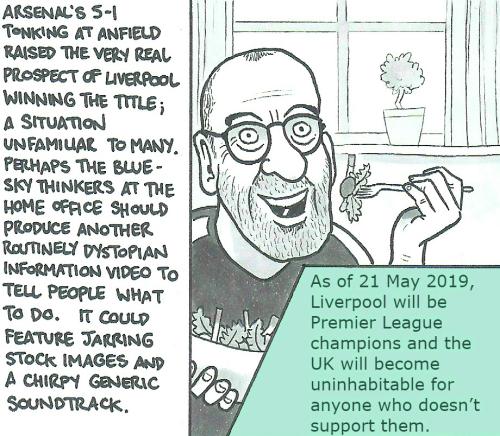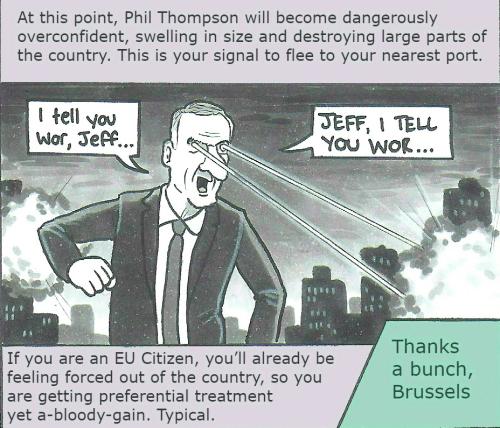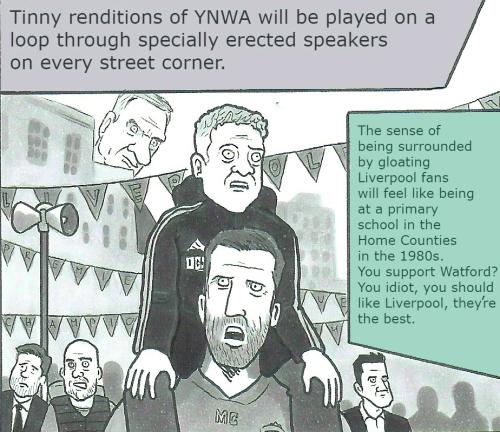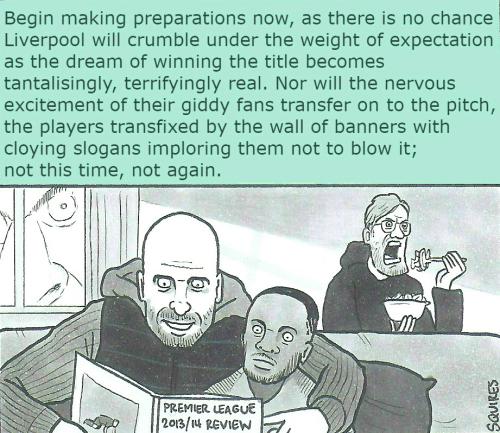https://www.thetimes.co.uk/article/every-supporter-should-celebrate-if-liverpool-triumph-f8m3677js
Football has always been a kick in the tribals. Rival fans lash out at the lauding of Liverpool, just as many fume at headlines celebrating Manchester United’s revival under Ole Gunnar Solskjaer and seethe at the deification of Mauricio “But what’s he won?” Pochettino.
It’s the supporter’s staple of insularity often stained with jealousy, almost amplifying love for their own team by loathing others. It’s being a fan. Opposing supporters fulminate at the lengthy eulogies bestowed on Emirates Marketing Project under the visionary Pep Guardiola, whose team was acclaimed as the greatest in Premier League history a month ago.
The focus has changed, the pendulum swinging more in Liverpool’s favour now. The media, far from fickle, simply reflects form and there is plenty of uplifting work, on and off the field, to reflect and respect now with Liverpool.
The possibility of Liverpool winning the title — and it needs stating again and again that a defiant, dynamic City still stand in their way — causes apoplexy among many. Talk to fans of other clubs and they frequently claim a media love-in with Liverpool. One Chelsea diehard totted up the number of former Liverpool players working as pundits and, exhausted, stopped at 44. Manchester United alumni fill studios, too.
Most of the former United and Liverpool pundits are pretty objective. Press boxes are neutral, and the three or four Liverpool fans by birth among the main 50-odd football writers are, to this observer’s eye, consistently balanced. Yes, they salute Jürgen Klopp and his team, just as they have City under Guardiola, United under Sir Alex Ferguson, Chelsea under José Mourinho and Arsenal, for the most part, under Arsène Wenger. And yet there is this perception of Liverpool being the media darlings. During an instructive debate on social media over the past 36 hours, one supporter retorted, and doubtless spoke for many: “Facts don’t matter when it comes to hating Liverpool.”
Why? What is it about Liverpool that stirs such antipathy? The tasteless “always the victim” chants from United visitors can be consigned to the shameful shadows where they belong when set against the bravery of so many Liverpool campaigners fighting for justice over Hillsborough. (During the run-in, April brings the 30th anniversary of the disaster, which will keep even the thought of a mere trophy, a mere sport in proper perspective).
Opposing fans accuse Kopites of a sense of entitlement, of living in the past, singing “we won it five times” about their European Cup feats, but great clubs do cherish their history. And if Chelsea fans’ banner of “making history, not reliving it” is a dig at Liverpool, they cannot also slam the Kop for revelling in the present. Isn’t this what every fan wants? A proud past and a future full of hope? Liverpool are in a good place then.
Rival fans spluttering about what Kopites will be like if they were to end 29 years without the title should imagine their own reaction if they had waited that long. Desperate for the trophy. Those holding on even longer, the likes of Everton and Spurs, should take heart that persistence may be rewarded. Even if Liverpool fail to outrun Guardiola’s champion thoroughbreds, there is so much to admire.
Liverpool possess many principles that should be valued even more in a changing, more corporate world. The game should be about glory, about trophies, which Klopp’s men chase and the Kop craves. Football should not be about the battle for fourth, the amassing of dividends for shareholders or who has got the biggest, busiest megastore. Liverpool seem to have the balance right between one foot in the community and one foot in the commercial world.
So those who decry the Kop, who believe that Liverpool fans are a “cult” with their banners and anthems should not forget that it was Liverpool supporters, along with Arsenal’s and a few others, who led the fight against Premier League clubs’ avarice on ticket prices.
In February 2016, the Kop called their owners out over the scandalous £77 charge for a seat for 90 minutes in the new stand, staging a walk-out and chorusing “you greedy bastards, enough is enough”. Fenway Sports Group (FSG), in fairness, backed down (although some issues remain). Liverpool’s chief executive, Peter Moore, recently took to social media to address fans’ frustrations about the members’ ticket sales process. There seems an accountability at Anfield not always found among elite English clubs.
Just talk to Arsenal fans. They would love to talk properly to their increasingly distant club. At Liverpool, FSG appointed Tony Barrett, formerly a football writer of The Times, as head of club and supporter liaison, a conduit between the terraces and corridors of power. When Liverpool visited Roma last May, it was Barrett, standing outside the Stadio Olimpico with many fans and too few open gates, contacting Uefa, urging them to react quickly. Uefa rarely respond with the requisite speed but Barrett got them to, preventing a bottleneck. No wonder his unstinting commitment to fans’ welfare earned him an award from the Football Supporters’ Federation. Other clubs are considering following Liverpool’s example, liaising better with supporters. Good.
Liverpool do many things right, keeping club close to community.
They have a manager in Klopp who cares, who used his Christmas message to hail the NHS and the work being carried out at Alder Hey hospital “with absolute world-class staff supporting those brave children and parents fighting some of life’s most important battles. I cannot tell you how high my respect and admiration is for everyone there”.
Most clubs would love Klopp representing them so passionately, engaging with fans, clearly loved by his players. And yet, beyond the bonhomie is a driven, almost ruthless figure, drawing fully on sports science to prepare his team. Liverpool even employ a specialist throw-in coach.
Klopp is about marginal gains as well as inspiring man-management. He is a man who understands his environment, whether dressing room, stand or surrounding streets, and connects with them emotionally. How many other managers do? Mourinho didn’t.
Klopp’s players are committed to their community work, like their peers elsewhere of course. Everton’s are exceptional. Arsenal In The Community has been changing — and saving — lives since 1985. Liverpool players certainly understand their responsibilities. The captain, Jordan Henderson, organised a whip-round at Melwood for Fans Supporting Foodbanks and met up with Liverpool fan Ian Byrne and Evertonian Dave Kelly, two of the driving forces behind this vital initiative. A foodbank van is stationed on club land on Anfield Road on match-day. Moore is a regular contributor and there is a drop-off point for donations in the Anfield shop.
Liverpool have kept their soul, not always easy for a club in the money-obsessed Premier League. Trent Alexander-Arnold hosted a lunch for the lonely and disadvantaged on Christmas Day, Henderson funded an event for underprivileged or disabled children two days before Christmas and handed out presents, while Alex Oxlade-Chamberlain visited a charity in Toxteth. Many players do this, as they should, using football as a force for good, but it is worth noting in the feverish debate about Liverpool that their squad is a collection of good characters as well as good players.
On the pitch, their talent is clear. It is important for the overall lustre of the Premier League that such a thrilling team, who have never won the title in the present format, are in contention. That might add a fistful of dinars to the next overseas broadcast deal. Everybody benefits.
Anybody who loves exciting, fearless football should appreciate the attacking from full back of Alexander-Arnold and Andy Robertson towards the predatory poetry in motion of Mo Salah, Sadio Mané and Roberto Firmino, who can whip up a storm in an instant.
As one Liverpool fan posting on the Red And White Kop forum observed: “We aren’t walking through the storm now — we are the storm.” The storm has built gradually and shrewdly under Klopp, a lesson to clubs, whatever the vicious views of rival fans.
Stan Kroenke, Arsenal’s absentee owner, could certainly look at what his compatriot John W Henry oversees at Liverpool: an outstanding, balanced recruitment structure, investing properly in ability, seeking out bargains such as Robertson at £8 million and also spending £75 million on a centre back of Virgil van Dijk’s commanding nature, rather than Sokratis and Shkodran Mustafi, defensive makeweights who cost Arsenal £53 million between them. So ignore the tribal screams; Liverpool should be seen as a model club in many ways.




